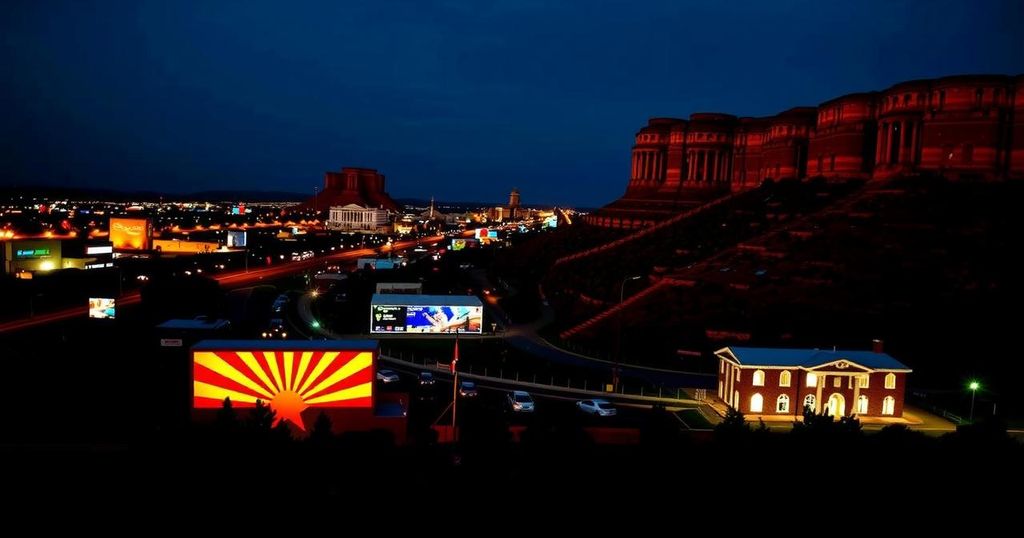World news
2024 PRESIDENTIAL ELECTION, AMERICA, ARIZONA, ASIA, CIVIL RIGHTS, CORPORATION COMMISSION, DEMOCRAT, DEMOCRATS, DONALD TRUMP, ELECTION, ELECTION INTEGRITY, KARI LAKE, MARK KELLY, MEXICO, NATIONAL CONFERENCE OF STATE LEGISLATURES, NORTH AMERICA, PHILIPPINES, PRESIDENTIAL ELECTION 2024, RUBEN GALLEGO, S. SENATE, TRUMP, U.S. ELECTIONS, UNITED STATES, WHITE HOUSE
Michael Grant
0 Comments
Arizona’s Political Landscape: Republican Ascendancy and Implications for Governance
The recent elections in Arizona have seen a notable shift towards Republican control, with Donald Trump once again achieving success in the state. While Democrat Ruben Gallego is likely to win a U.S. Senate seat, Republicans dominated lower ballot positions. Public safety emerged as a paramount concern, reflected in successful propositions, while proposals aimed at reshaping electoral processes faced strong opposition.
The political landscape in Arizona appears to have shifted significantly following the recent elections, solidifying Republican dominance within the state. Despite the anticipation of a competitive environment, Arizona emerged as a red state, a shift that diverges from the tightly contested boundaries observed during the 2020 elections. While Democrat Ruben Gallego is likely to secure the U.S. Senate seat, Republicans have showcased robust performances in other positions, including clinching all Arizona Corporation Commission seats and a majority of offices in Maricopa County. Nationally, the Republicans have rallied under the leadership of Donald Trump, who has managed to reclaim a strong foothold after previously enduring a tumultuous presidential term. His recent successes appear to have galvanized the party towards achieving notable victories across the nation, restoring Republican control over the U.S. Senate while maintaining a precarious hold over the House of Representatives. This consolidation of power raises concerns regarding potential gridlock and the advancement of contentious policies. In the legislative arena, Arizonans have demonstrated a preference for stability, having elected to retain two Supreme Court justices. The overwhelming majority support for justices Clint Bolick and Kathryn King reflects a desire for judicial independence, particularly during a time when political pressures mount on the judiciary. The focus during this election cycle was not solely on party affiliations, as public safety propositions gained traction, indicating a shift in voter concerns toward immediate and pressing local issues. Notably, several propositions aimed at enhancing public safety emerged successful. Each initiative highlights public sentiment regarding the safety and welfare of communities across Arizona. Conversely, propositions aiming to alter the political landscape were met with resistance, reflecting a prevailing preference to maintain the status quo in state elections. The evolving dynamics in Arizona signal a significant chapter in the political sphere, underlining Republican strength alongside pivotal advancements in local governance, as well as justice and public safety policies set to shape the trajectory of the state in the years to come.
In the aftermath of recent elections, Arizona has not only demonstrated a notable shift toward the Republican Party but also shown an inclination towards maintaining a particular political structure amid changing national sentiments. Historically a competitive battleground, Arizona’s latest results indicate a consolidation of Republican power, impacting local and national dynamics. The party’s resurgence has catalyzed discussions regarding governance, legislative productivity, and voter priorities, particularly in relation to public safety and judicial integrity which play a crucial role at state and national levels.
In conclusion, the recent electoral results in Arizona underscore a significant realignment towards Republican governance while highlighting pivotal issues concerning public safety and judicial independence. With Trump reestablishing a foothold at the national level, the interplay between partisan control in Congress and state legislation is critical. As the political landscape evolves, the future of Arizona’s governance will remain intertwined with broader national agendas and local priorities, warranting careful observation by constituents and officials alike.
Original Source: www.azcentral.com




Post Comment